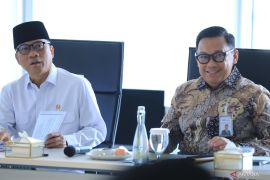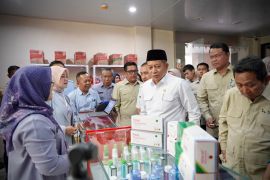"International trade is still an important issue to foster economic recovery," the minister noted here on Wednesday, while responding to the disagreements regarding international trade at the G-20 in Germany.
She added that finance ministers from G-20 member countries of Europe, Asia, and Latin America have realized the adverse effects of protectionism.
She pointed out that although there were no agreements on the importance of maintaining world trade based on global rules at the meeting in Germany, the G-20 communique on international trade could be approved soon.
"We hope that the G-20 would be able to provide a commitment, because protectionism could lead to trade wars and destructive currency impacts that would not only affect G-20 but also other countries," she noted.
Sri Mulyani hoped that international trade commitments could be agreed at a meeting of the G-20 leaders, because of the importance of cooperation to enhance global economy.
The minister remarked that at the G-20 leaders-level meeting, Indonesia will emphasize the importance of international economic policy for the export sector as it is one of the contributors to national economic growth.
"Indonesia is an open country, and its exports have become a source of its economic growth. We expect the international trade to remain open and for Indonesia to conduct trade based on our competition level," she asserted.
According to her, one way to boost export performance would be to strengthen bilateral relations with new open markets and no longer rely on conventional destinations such as China and the United States.
"We hope that Indonesia will open up new markets. There are many opportunities among the G-20, because we have pretty much direct trade channels. We should strengthen bilateral relations that are still open, including in the US, despite its trade policy being uncertain," she revealed.
The international trade issues were discussed at the G-20 meeting in Baden-Baden, Germany, on March 17 and 18, 2017. The discussion was important to avoid a devaluation of the exchange rate.
However, a commitment on international trade was not agreed, signaling that the global binding rules were no longer the basis of world economic and trade relations. Consequently, strong states can dictate and dominate the relationship according to their own interests and not by mutual agreements.
Although the communique on trade failed to reach an agreement, the G-20 meeting had reinforced its commitment to support stronger, sustainable, balanced, and inclusive growth strategies to maintain global growth momentum in the long term.(*)
Editor: Heru Purwanto
Copyright © ANTARA 2017











